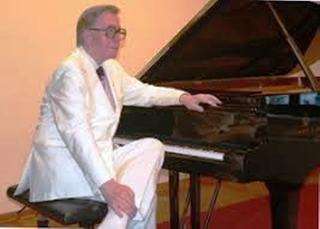|
Back
Remembrance of Triumphs Past New York
Weill Recital Hall, Carnegie Hall
09/18/2017 -
Franz Liszt: Polonaise No. 2 in E Major, S. 223 – Csárdás obstiné from Two Csárdás S. 225 – Consolation No. 3 in E Major – Après une lecture du Dante, fantasia quasi sonata, from Années de pèlerinage (Deuxième Année)
Robert Schumann: Widmung, Op. 25, No. 1 (arr. Liszt)
Felix Draeseke: Sonata quasi Fantasia, Op. 6
Hans-Dieter Bauer (Pianist)

H.-D. Bauer (© Carnegie Hall.com)
While the name Hans-Dieter Bauer was unknown to me, the pianist was apparently quite the wunderkind in Germany during his youth 80 years ago. In fact, judging from his selections last night, one would imagine he could have been a dazzling artist, ripping through Liszt and Schumann, perhaps even essaying a bit of Beethoven and Mozart.
His recital last night offered us vague shadows from that glorious youth. The first half was indeed Franz Liszt, and he played five works with knowledge, familiarity and nuances of a once-formidable technique. There were numerous digital mistakes, but even the greatest pianist, carried away by their own emotion, allows the spirit to overtake the technique.
Mainly missing, though, was even a scintilla of basic inspiration. It would be unfathomable to say that Après une lecture du Dante could be played by rote. And indeed, Mr. Bauer sailed through this extraordinarily difficult work with all the desired expression. Yet that expression seemed canned, seemed a memory of triumphs past.
The opening Polonaise is a watered-down Chopin with a center of bombast. Mr. Bauer was not bombastic, yet he never essayed a tittle of the music’s grace. The transcription of Schumann’s Widmung is an emotional work, yet one felt the emotions were manufactured vestiges. Even the Third Consolation, gentle, inward, yes, consoling, was offered the way the notes appear on any score, but Mr. Bauer’s personality was nowhere to be found.
I was indeed looking forward to Liszt’s Csárdás obstiné, for this is a piece of Liszt’s absurdity. Even playing it literally–in fact, only playing it literally–does that come through. This was the kind of music Marc-André Hamelin might give as an encore. It was genius at play. Mr. Bauer’s performance was the straightforward playing of a genius.
This might be unfair, but in their later years, both Artur Rubinstein and especially Vladimir Horowitz lacked fingertip perfection–and they knew it. But instead of trying to give false imitations of their earlier triumphs, they wickedly dressed up their deficiencies with masses of faux-styling. The echo pedal was pressed down constantly, they exaggerated the pauses, or ran through the difficult passages with meaningless velocity.
In a sense, they disguised their music with masses of Sacher-torte cream, and when necessary they would augment their music with the kind of cosmetics which a Pnom Penh harlot might abjure.
So perhaps Mr. Bauer–stiff as he was, lacking an underlying feeling–showed a certain kind of honesty. And for this he could be admired.
The second half was devoted to a single late 19th Century work which was admired by Liszt. To prepare myself, I listened to a recording of Felix Draeseke’s Sonata quasi Fantasia on YouTube, finding it, like much Liszt, quite stunning for a pianist, but otherwise dreary, specious and turgid. Still, I was willing to give it hearing.
Mr. Bauer devoted his program notes solely to this work, and one line of his long description (obviously a translation, and I omit the typos) is worthy of reprint.
“The one who tries to get close to this holy relic soon has to decide either to give up without delay or to surrender with the persistence of an elephant to this scurrilous work of fragile beauty.”
Well, I have worked with Thai elephants, and they are anything but persistent. So after the first half of the program, I decided to “give up without delay” and left Weill Concert Hall with few regrets.
Harry Rolnick
|